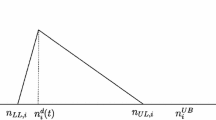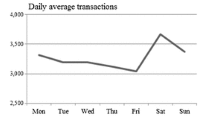Abstract
Social Engagement is a novel business model whose goal is transforming final users of a service from passive components into active ones. In this framework, people are contacted by the decision-maker (generally a company) and they are asked to perform tasks in exchange for a reward. This paves the way to the interesting optimization problem of allocating the different types of workforce so as to minimize costs. Despite this problem has been investigated within the operations research community, there are no approaches that allow to solve it by explicitly and appropriately modeling the behavior of contacted candidates through consolidated concepts from the utility theory. This work aims at filling this gap, by proposing a stochastic optimization model that includes a chance constraint putting in relation, under probabilistic terms, the candidate willingness to accept a task and the reward actually offered by the decision-maker. The developed model aims at optimally deciding which user to contact, the amount of the reward proposed, and how many employees to use in order to minimize the total expected costs of the operations. An approximation-based solution approach is proposed to address the formulated stochastic optimization problem and its computational efficiency and effectiveness are investigated through an extensive set of computational experiments.
Access this chapter
Tax calculation will be finalised at checkout
Purchases are for personal use only
Similar content being viewed by others
References
Corno, F., Russis, L.D., Montanaro, T.: Estimate user meaningful places through low-energy mobile sensing. In: 2016 IEEE International Conference on Systems, Man, and Cybernetics (SMC). IEEE, October 2016. https://doi.org/10.1109/smc.2016.7844703
Sergi, I., et al.: An IoT-aware smart system to detect thermal comfort in industrial environments. In: 2021 6th International Conference on Smart and Sustainable Technologies (SpliTech). IEEE, September 2021. https://doi.org/10.23919/splitech52315.2021.9566378
Santini, A., Viana, A., Klimentova, X., Pedroso, J.P.: The probabilistic travelling salesman problem with crowdsourcing. Comput. Oper. Res. 142, 105722 (2022). https://doi.org/10.1016/j.cor.2022.105722
Malagnino, A., Montanaro, T., Lazoi, M., Sergi, I., Corallo, A., Patrono, L.: Building information modeling and internet of things integration for smart and sustainable environments: a review. J. Clean. Prod. 312, 127716 (2021). https://doi.org/10.1016/j.jclepro.2021.127716
Guo, B., Zhang, D., Wang, Z., Yu, Z., Zhou, X.: Opportunistic IoT: exploring the harmonious interaction between human and the internet of things. J. Netw. Comput. App. 36(6), 1531–1539 (2013). https://doi.org/10.1016/j.jnca.2012.12.028
Fadda, E., Perboli, G., Tadei, R.: A progressive hedging method for the optimization of social engagement and opportunistic IoT problems. Eur. J. Oper. Res. 277(2), 643–652 (2019). https://doi.org/10.1016/j.ejor.2019.02.052
Fadda, E., Perboli, G., Tadei, R.: Customized multi-period stochastic assignment problem for social engagement and opportunistic IoT. Comput. Oper. Res. 93, 41–50 (2018). https://doi.org/10.1016/j.cor.2018.01.010
Fadda, E., Mana, D., Perboli, G., Tadei, R.: Multi period assignment problem for social engagement and opportunistic IoT. In: 2017 IEEE 41st Annual Computer Software and Applications Conference (COMPSAC). IEEE, July 2017. https://doi.org/10.1109/compsac.2017.173
Alnaggar, A., Gzara, F., Bookbinder, J.H.: Crowdsourced delivery: a review of platforms and academic literature. Omega. 98, 102139 (2021). https://doi.org/10.1016/j.omega.2019.102139
Hanemann, W.M.: Willingness to pay and willingness to accept: how much can they differ? Am. Econ. Rev. 81(3), 635–647 (1991)
Archetti, C., Savelsbergh, M., Speranza, M.G.: The vehicle routing problem with occasional drivers. Eur. J. Oper. Res. 254(2), 472–480 (2016)
Gdowska, K., Viana, A., Pedroso, J.P.: Stochastic last-mile delivery with crowdshipping. Transp. Res. Proc. 30, 90–100 (2018)
Fishburn, P.C.: Utility theory. Manage. Sci. 14(5), 335–378 (1968)
Paneque, M.P., Bierlaire, M., Gendron, B., Azadeh, S.S.: Integrating advanced discrete choice models in mixed integer linear optimization. Transp. Res. Part B Methodol. 146, 26–49 (2021). https://doi.org/10.1016/j.trb.2021.02.003
Li, P., Arellano-Garcia, H., Wozny, G.: Chance constrained programming approach to process optimization under uncertainty. Comput. Chem. Eng. 32(1–2), 25–45 (2008)
Nemirovski, A., Shapiro, A.: Scenario approximations of chance constraints. In: Probabilistic and Randomized Methods for Design Under Uncertainty, pp. 3–47 (2006)
Margellos, K., Goulart, P., Lygeros, J.: On the road between robust optimization and the scenario approach for chance constrained optimization problems. IEEE Trans. Autom. Control 59(8), 2258–2263 (2014)
Statistics explained. https://ec.europa.eu/eurostat/statistics-explained/index.php?title=Wages_and_labour_costs
Ermagun, A., Stathopoulos, A.: To bid or not to bid: an empirical study of the supply determinants of crowd-shipping. Transp. Res. Part A Policy Pract. 116, 468–483 (2018). https://doi.org/10.1016/j.tra.2018.06.019
Marcucci, E., Pira, M.L., Carrocci, C.S., Gatta, V., Pieralice, E.: Connected shared mobility for passengers and freight: investigating the potential of crowdshipping in urban areas. In: 2017 5th IEEE International Conference on Models and Technologies for Intelligent Transportation Systems (MT-ITS). IEEE, June 2017. https://doi.org/10.1109/mtits.2017.8005629
Miller, J., Nie, Y.M., Stathopoulos, A.: Crowdsourced urban package delivery. Transp. Res. Record. J. Transp. Res. Board. 2610(1), 67–75 (2017). https://doi.org/10.3141/2610-08
McFadden, D.: The measurement of urban travel demand. J. Public Econom. 3(4), 303–328 (1974) . https://EconPapers.repec.org/RePEc:eee:pubeco:v:3:y:1974:i:4:p:303-328
Pourrahmani, E., Jaller, M.: Crowdshipping in last mile deliveries: operational challenges and research opportunities. Soc. Econ. Plann. Sci. 78, 101063 (2021). https://doi.org/10.1016/j.seps.2021.101063
Godfrey, V., Powell, W.B.: An adaptive, distribution-free algorithm for the newsvendor problem with censored demands, with applications to inventory and distribution. Manage. Sci. 47(8), 1101–1112 (2001)
Cuzzocrea, A., Fadda, E., Baldo, A.: Lyapunov central limit theorem: theoretical properties and applications in big-data-populated smart city settings. In: 2021 5th International Conference on Cloud and Big Data Computing (ICCBDC). ACM, August 2021. https://doi.org/10.1145/3481646.3481652
Author information
Authors and Affiliations
Corresponding author
Editor information
Editors and Affiliations
Rights and permissions
Copyright information
© 2024 The Author(s), under exclusive license to Springer Nature Switzerland AG
About this paper
Cite this paper
Bierlaire, M., Fadda, E., Tiotsop, L.F., Manerba, D. (2024). Workforce Allocation for Social Engagement Services via Stochastic Optimization. In: Fidanova, S. (eds) Recent Advances in Computational Optimization. WCO 2022. Studies in Computational Intelligence, vol 1158. Springer, Cham. https://doi.org/10.1007/978-3-031-57320-0_5
Download citation
DOI: https://doi.org/10.1007/978-3-031-57320-0_5
Published:
Publisher Name: Springer, Cham
Print ISBN: 978-3-031-57319-4
Online ISBN: 978-3-031-57320-0
eBook Packages: Intelligent Technologies and RoboticsIntelligent Technologies and Robotics (R0)




